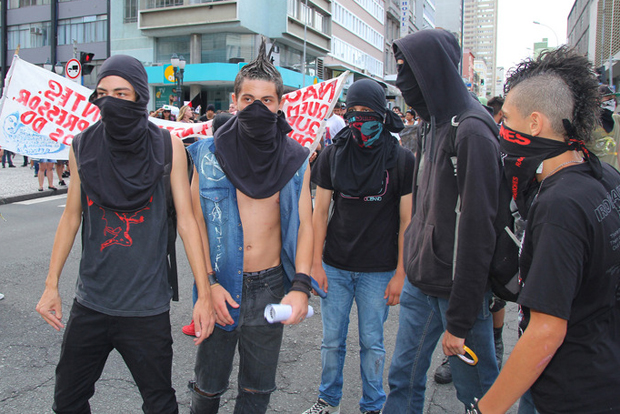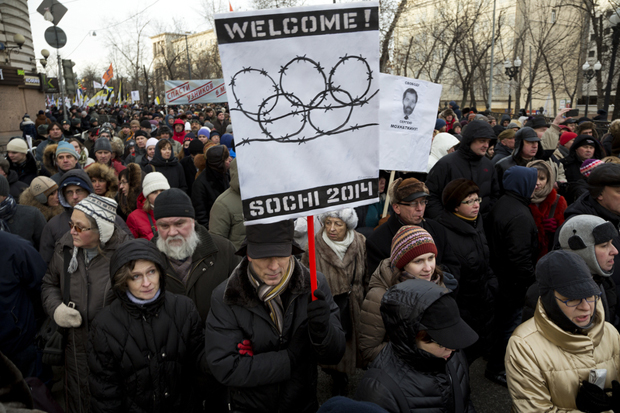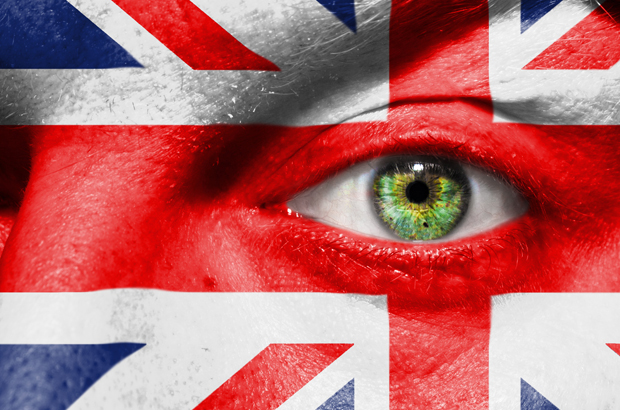5 Feb 2014 | Brazil, News, Politics and Society

In Curitiba, about 300 protesters took to the streets of the central city asking for more health and safety improvements in the country and against the hosting of the World Cup 2014 in Brazil. Photo: João Frigério / Demotix
In the wake of mass protests sparked by rising transport fares in 2013, Brazil has embraced measures aimed at containing protests. One of the most controversial bans the use of masks during demonstrations.
Approved by the governor of Rio de Janeiro, Sergio Cabral, Act 6.528 stipulates that it is “especially forbidden” to wear masks or other means to prevent identification of protesters. The criminalization of masks was also adopted by the state of Pernambuco and cities across the country without legislative consideration. Act 6.528 also contains a provision that requires telephone companies and internet service providers to respond within 24 hours to police requests for information about masked demonstrators that have been arrested.
The Rio de Janeiro law not only prohibits masks: hoods, scarves or anything that hides the face of demonstrators is likely to draw the attention of security services. Protesters who refuse to remove their mask are taken to a police station to be photographed and fingerprinted for identification.
While violence was limited to small groups during the mass protests that target social inequality, official corruption and the staggering cost of the 2014 Brazil World Cup venues, the Brazilian media has routinely showed photos of masked participants and labelled them as “vandals”, “rioters” and “anarchists”.
Authorities say the mask ban is justified and necessary to protect public and private property from “criminals” and in the name of “public safety”. But some Brazilian lawyers say the ban is a fundamental violation of civil rights and is a dangerous precedent for the country’s democracy.
Specifically, legal specialists say, the prohibition violates Article 5 of Brazil’s federal constitution. In September, the National Human Rights Commission of the Ordem dos Advogados do Brazil challenged the mask ban in court. Another legal challenge has been filed in Rio de Janeiro state as the law “prevents the citizen’s right to free expression”. So far, neither challenge has had any effect.
Human rights organizations claim that the prohibition is an extreme violation of freedom of expression and charge the government with authoritarian motives. Amnesty International has called on the government to respect the right to protest, and halt the arbitrary arrests and criminalization of protester, since the actions are a violation of Brazil’s constitution. Further, Amnesty says, the ban endangers the fundamental principles of a democratic state and are “typical of authoritarian regimes”.
In late January, demonstrations against the World Cup took place in 14 cities – led by hundreds of masked protesters. In Sao Paulo alone, more than a 100 people were arrested. One unmasked protester, Fabrizio Proteus, was shot twice and interrogated by police officers while he was still in intensive care. Activists claim the interrogation and the information he provided was illegal.
For her part, Brazil’s president, Dilma Rousseff, who is worried about elections, is backing an extensive advertising campaign to defend the World Cup. Public spending on the event has topped 8 billion Reais or £2.032 billion. Critics of the government spending have formed a movement under the banner of “Nao Vai Ter Copa”, “No World Cup”, to cause agitation against the games. The president’s advisors say new mass protests may have a negative impact on her re-election plans. In 2013, Rousseff’s popularity ratings fell over 20 per cent during the protests.
In the meantime, the Federal Police and the Agência Brasileira de Inteligência (Brazilian Intelligence Agency – Abin) are scanning the internet, especially on social networks, in search of “agitators” and suspects.
Everything indicates that repression has just begun.
This article was originally published on 5 February 2014 at indexoncensorship.org
5 Feb 2014 | About Index, Campaigns, Press Releases
After two years at the helm of Index on Censorship, Chief Executive Kirsty Hughes will be leaving the leading international freedom of expression organisation in mid-April to pursue new projects and writing in the international and European politics arena.
Hughes joined Index in April 2012 taking its international editorial and advocacy strategy to new audiences and leading Index in its work on international digital freedom, including Index’s opposition to mass surveillance as revealed by the Snowden revelations, reinforcing its work in authoritarian and transition regimes around the world, and introducing a new focus on the question of access to freedom of expression. Hughes has been a key commentator and evangelist for Index, raising the organisation’s profile in the United Kingdom, India, Brazil, the EU and the United States.
Index on Censorship is currently seeking a leading free speech defender as our new CEO. Full details on the role can be found here.
5 Feb 2014 | News, Russia

Several thousand protesters marched through central Moscow on 2 February 2014 to call for the release of 20 people who were arrested after clashes between police and demonstrators on 6th May of 2012. Photo: Nickolay Vinokurov / Demotix
Media will face increased restrictions in the build up to the Winter Games in Sochi as Russian president Vladimir Putin tries to rehabilitate a damaged domestic reputation, experts suggest.
Tighter controls on dissident media, more proactive use of state news outlets to mold public consensus, and obstacles to foreign reporters operating in the region can all be expected as the games begin on 7 February.
While Russian authorities have hailed the Games as a triumph, ongoing disputes over the payment of migrant workers, the environmental impact of Sochi’s intensive development, forced evictions of residents, intensive security measures, and Russia’s controversial gay propaganda law have all generated a domestic backlash that many believe is being deliberately ignored by state media. On 17 October, 2013, Roman Kuznetsov, a migrant worker from the Russian city of Orenburg who had helped build the Media Centre for the Sochi Olympic Games, sewed his lips shut with a needle and thread in protest against his employer’s failure to pay him several months of wages. He carried a sign that explained “Please help get reporters attention! I am not from around here”.
In an interview with select global media, Putin explained “I would like the participants, guests, journalists and all those who watch the Games on TV and learn about them from the mass media to see a new Russia, see its personality and its possibilities, take a fresh and unbiased look at the country”. Close restrictions recently imposed on press activity suggest otherwise. Only a small number of Olympic Events have been cleared for coverage by local journalists, including the arrival of IOC delegations and formal updates offered by federal officials. Access to government activities is granted only to the All-Russia State Television and Radio Broadcasting Company.
In a report produced by the Centre for the Protection of Journalists, a number of local journalists allege a more proactive media strategy in addition to direct censorship. Several reporters suggested that it was fairly common for media that receive funding to be directly censored by the administration. Local journalists also reported that the All-Russia State Television and Radio Broadcasting Company often stage interviews, and had been passing off closely scripted lines as dialogue with ordinary residents of Sochi. According to Russian Government website Zakupki, which details financial transactions at all levels of Russian government, the Sochi administration has distributed some 32,628.600 rubles (US$988,788) to 17 media organisations, including four television channels, six newspapers, one magazine, three radio stations, and one informational agency. It is not clear what form the funds took.
Aleksandr Valov, founder of BlogSochi, which seeks to document the impact of the Games on Sochi’s residents, explains “One begins to understand why Sochi media only talk about the government’s achievements and keep silent about the problems. The popular saying ‘He who pays the piper calls the tune’ comes to mind.”
International journalists covering Sochi have also been closely curtailed. Police from the Russian Republic of Adygea neighboring Sochi repeatedly stopped, detained, and threatened a two-person crew from Norway’s TV2- the country’s official broadcaster of the Olympic Games. At every stop and in detention, officials questioned the journalists aggressively about their work plans in Sochi and other areas, their sources, and in some cases about their personal lives, educational backgrounds, and religious beliefs. In several instances they denied the journalists contact with the Norwegian Embassy in Moscow. One official threatened to jail them both, the journalists told Human Rights Watch. Dutch photojournalist Rob Hornstra was denied a Russian visa in an apparent attempt to stop him from doing further work in the turbulent North Caucasus, and American journalist David Satter was forcibly expelled from the country in December.
Since beginning his first term as president in 2000, Vladimir Putin has carefully controlled his media presence, closing a number of independent media outlets and amalgamating others with state bodies, whilst tightly controlling the presence of foreign media. Professor Owen Johnson teaches at the School of Journalism at Indiana University, and has researched the role of media in Russia intensively. He offers a simple explanation for the recent expulsions ‘”While it would seem that this runs counter to other more positive actions by President Putin recently, this might be designed to make visiting journalists more cautious,” Johnson said. “Putin is less concerned about world public opinion than he is about his continued support in Russia.”
Domestic attitudes to Putin are changing fast, according to Mikhail Dmitriev, former director of Russia’s State Run Centre for Strategic Research. Over the past year discontent in the country at large has deepened and broadened, spreading across all social groups and ages. While support for Putin is stable in St. Petersburg and Moscow, where incomes remain high, fluctuating fortunes in Russia’s rural regions is starting to generate distrust. Dmitriev said the latest focus groups show that Putin is less associated with stability and more with uncertainty. His past achievements are becoming a distant memory, and his recent stunts, such as flying with cranes or diving for ancient amphorae, merely cause irritation.
The Sochi Games, Putin explained in a conference with journalists, will be an important global symbol of Russian achievement and resurgence. For Putin, well-managed domestic media coverage seems an important strategic component of his long term success and survival.
This article was originally posted on 5 February 2014 at indexoncensorship.org
4 Feb 2014 | News, Politics and Society, United Kingdom

(Photo illustration: Shutterstock)
The coalition has found a novel way of making life harder for Britain’s journalists. Now it appears to have set itself the challenge of abandoning the reforms without losing face, too.
What’s at stake here is simple: the ability of journalists to protect their sources. This is critical. Without it confidence in journalism is undermined and fewer whistleblowers will come forward in the future.
This is why the government’s latest bid to make life harder for Britain’s hacks – coming so soon after the gagging bill – is so very deeply worrying.
The plans effectively scrap legal guarantees that journalists’ lawyers can contest “production orders” demanding the surrender of key documents.
The measure forms part of the coalition’s deregulation bill – a weighty piece of legislation which aims to scrap a huge pile of red tape it believes has been weighing the UK down for years.
The zeal with which ministers have pursued this bonfire of the rules has risked stripping back important safeguards which make the UK a better country.
For 30 years the regulations governing police applications for the production of journalistic material by the media have been largely unchanged.
Whenever hacks have found their documents being seized by the long arm of the law, their lawyers have had a chance to contest the handover of photographs, files, notebooks and the like.
The result has been the media has had a chance to put across its side of the story when judges hear applications for the production orders.
In legal circles, the name for what happens when opposing lawyers have an argument in front of a lawyer is known as ‘inter partes’ – literally, between the parties.
If the deregulation bill passes unamended, they’d have to find a different name altogether. Because only one of the parties would be present.
This particular bit of red tape would make sure the police have it easy when it comes to winning over wavering judges.
As the responsible Cabinet Office minister Oliver Letwin glibly put it, newspapers would be losing “the guarantee of their day in court”.
The Newspaper Society, which represents titles read by a total of 31 million people a week, puts it another way.
The right to argue against these production orders, it says, are “vital to the Act’s protection of journalistic material against inappropriate police action… they are integral to parliament’s intention to safeguard freedom of expression, facilitate public interest reporting and maintain media independence of the police”.
In short, they really matter. Without them, it’s feared, the courts could decide – very reasonably – that the Commons doesn’t care as much as it did about safeguarding confidential sources from police officers.
There would be nothing to stop future governments undermining or even scrapping the existing safeguards altogether.
One of the most significant changes the committee which decides on these criminal procedure rules could make is to extend the use of ‘closed material procedures’.
These, as the Guardian’s chief lawyer Gill Phillips has written, “contravene a fundamental common law principle of open justice”.
Secret courts are never good news. So it’s no surprise she concludes: “This appears to be yet another backdoor attempt to limit and restrict essential and hard fought journalistic protections.”
Monday’s debate on the legislation was only on its second reading, which means it is at the start of its long journey through the Commons and then the Lords. There is plenty of time, it’s felt, for the government to make a concession and abandon this particular change.
But the recent experience of the gagging bill – a tortuous, hard-fought process which resulted in concessions that quelled the opposition without actually fundamentally changing the feared effect – suggests that seemed improbable.
That was the feeling, at least, before the minister stood up and, in response to a teed-up question from media committee chair John Whittingdale, began what looked a lot like the first stage of a government retreat.
“I have good news,” Letwin announced ingratiatingly at the despatch box. He explained the criminal procedure committee is to be prevented from weakening the rules.
“As it was no part of the intention of clause 47 to do that,” Letwin said, “we are now looking for ways specifically to exempt journalism and all such media items from the clause.”
This is what even cynical campaigners admit is a breakthrough. But it is not yet a white flag. All Letwin has agreed to is a further consultation – an opportunity for newspapers, broadcasters and others in the media to put their views forward.
It’s the same old process, isn’t it? The government blunders into proposing deeply damaging legislation and suddenly finds itself forced on to the backfoot, with its credibility at stake, in an area it should never have gone anywhere near.
In this case, MPs are hoping the coalition has been caught early enough for meaningful changes to take place.
As Tory backbencher David Davis gently suggested, in a desperate effort to be so sensitive to ministerial feelings it sounded almost sarcastic: “This is an area where some of the rules are constitutionally quite important.” That’s one way of putting it, anyway.
Letwin is willing to talk. Will he be willing to move, too? If it’s going to happen, the likelihood is the climbdown will come in the next few days.
The stakes are high. For Letwin, reversing yet another attempt to make life harder for Britain’s journalists is about more than just reputation. It’s about doing the right thing, too.
This article was posted on 4 February 2014 at indexoncensorship.org



